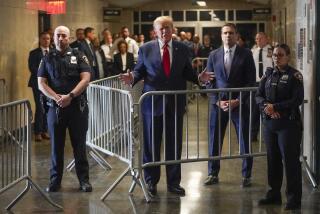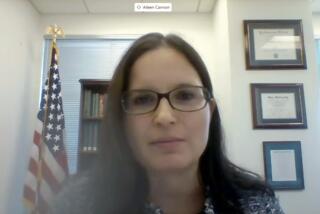Judge Demands an Early Start to North Trial
- Share via
WASHINGTON — U.S. District Judge Gerhard A. Gesell, rebuking attorneys in the Iran-Contra criminal case for dawdling over procedural matters, indicated Tuesday that he wants to begin the trial of Lt. Col. Oliver L. North and his three associates as early as July, months before either the defense or prosecution has suggested.
In a pretrial hearing on the case, Gesell demanded an end to what he called a legal “cat and mouse game” between independent counsel Lawrence E. Walsh and defense attorneys so that a trial of the four men could be finished before November’s presidential election.
Assails Restrictions
At one point, he warned Walsh that “ridiculous” government restrictions on secret data in the case, which could take months to resolve, could force the dismissal of charges against the men because their rights to quick and fair hearings would be violated.
Gesell reached no decision on a trial date. He said the proceedings should last about three months and voiced concern that a longer trial, overlapping the November elections, could affect the presidential race.
Walsh said that a trial beginning in September would be “more realistic” than July, but he said that his staff would meet a July deadline if Gesell orders it.
However, lawyers for North and defendants John M. Poindexter, Albert A. Hakim and Richard V. Secord strongly objected to the expedited schedule. They said that a trial would last at least six months and maintained that they could not possibly review the 900,000 pages of evidence and hundreds of witnesses in the case before next March.
“Evelyn Wood couldn’t read those documents by July,” North’s lawyer, Brendan V. Sullivan Jr., told Gesell, referring to the founder of a famous speed-reading course. “If we all stayed here tonight and didn’t go home until February, we still couldn’t prepare that case properly.”
But Gesell, who previously has made clear his plan to bring the massive case to trial as quickly as possible, appeared little moved by the complaints.
Another Hearing
He regularly rebuked lawyers on both sides for wrangling over pretrial procedures and set another hearing for April 25--an unusually short time--to determine whether Walsh has adequate evidence against the defendants to proceed with a trial.
The judge warned defense lawyers that their behavior “suggests you’re not anxious” to begin a trial soon. The lawyers said they plan to file a sheaf of motions seeking to dismiss or modify the upcoming trial on a long list of legal grounds.
Outside experts long have speculated that the defendants hope to delay a trial until after November’s election in hope of improving their chances of obtaining pardons from President Reagan.
‘Stump Speech’ Hit
When attorney Richard W. Beckler protested Gesell’s fast-lane approach too strongly, saying that it would “seriously prejudice” the defense of his client, former National Security Adviser Poindexter, Gesell lectured him: “I don’t want speeches like that in my court. . . . That’s just a stump speech and I suggest you don’t make many more of them.”
But Gesell appeared less troubled by delaying tactics than by White House and CIA curbs on national security information that the defendants contend they need to prepare their cases.
Saying that he is “very troubled” by those restrictions, Gesell invited defense lawyers to file a motion arguing that their lack of access to the data is denying their clients the right to a fair trial.
He also warned Walsh of the dangers posed by the national security question to the indictments brought against the four defendants last month.
‘Year From Thanksgiving’
“We’re not going . . . to negotiate (classified) documents in and out of this courtroom and then decide we’ll have a trial a year from Thanksgiving,” Gesell said. “It’s not a speedy trial, and it’s not a fair trial.”
Walsh told Gesell that most of the 300,000 classified documents assembled by investigators must be reviewed and declassified by a federal panel before they can be turned over to defense lawyers, a process that he admitted could take months.
Defense lawyers also complained that national security rules have denied them the right to interview some witnesses with knowledge of government secrets and others, outside the United States, who are not “cleared” to discuss some of the classified matters at issue.
Rejects Argument
Gesell rejected outright the argument of a White House lawyer at the hearing that the cumbersome declassification rules are required to prevent disclosure of highly sensitive government information scattered throughout the evidence.
“The classification system must be adjusted to meet the needs of this case or the case will collapse,” Gesell said.
The four defendants are accused of conspiracy, fraud and theft in connection with the secret sale of U.S. arms to Iran in 1985 and 1986. The indictment against them charges that they diverted proceeds from the sale to their own uses and to Nicaragua’s rebels
More to Read
Sign up for Essential California
The most important California stories and recommendations in your inbox every morning.
You may occasionally receive promotional content from the Los Angeles Times.










